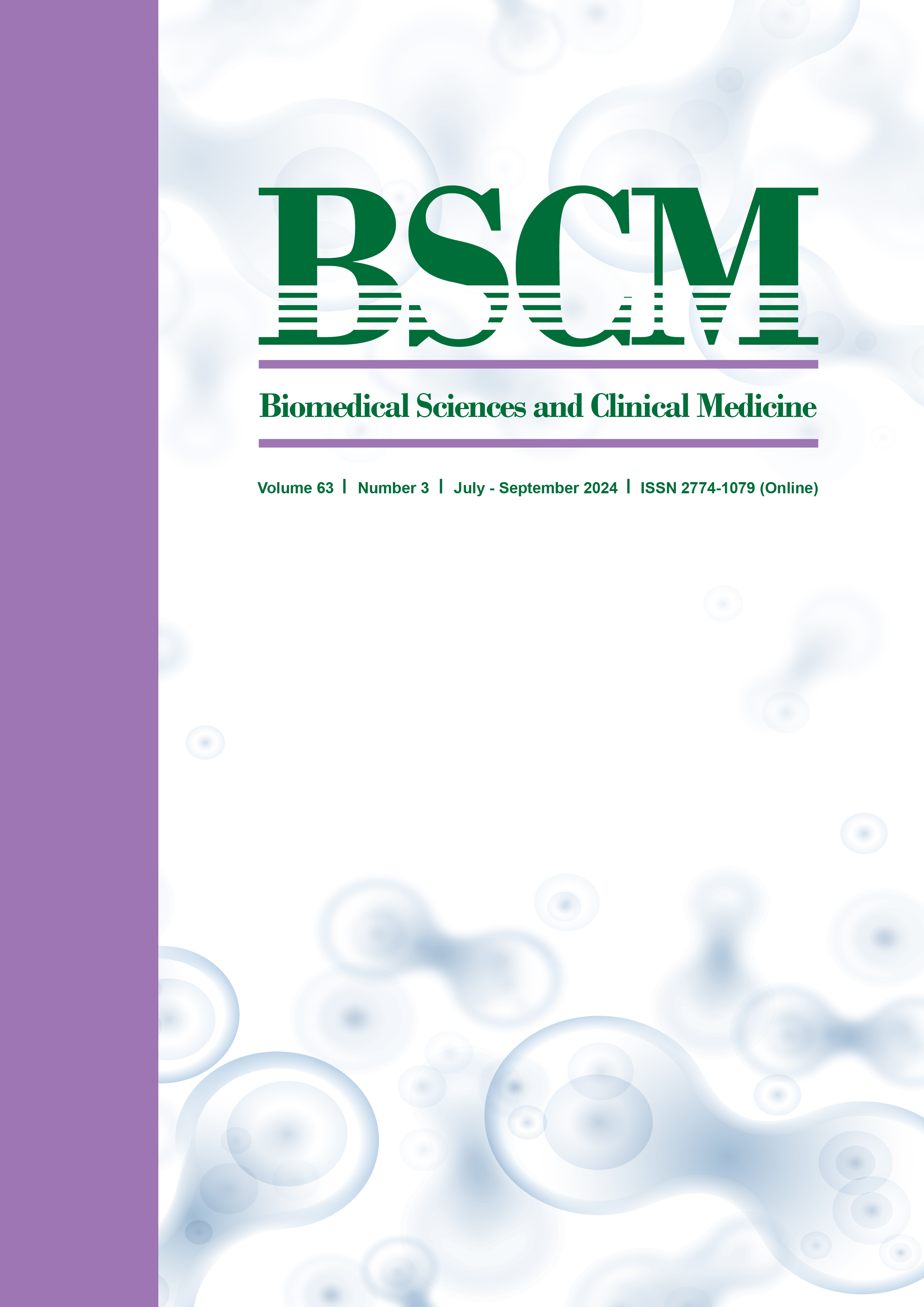Coinherited Hemoglobin Lansing-Ramathibodi/Southeast Asian Deletional α0-thalassemia and Hemoglobin E Causing Falsely Low Oxygen Saturation on Pulse Oximetry
คำสำคัญ:
alpha-thalassemia, coinheritance, hemoglobin Lansing- Ramathibodi, low SpO2, oxygen saturationบทคัดย่อ
Hemoglobin (Hb) variants resulting from mutations in globin genes and leading to qualitative abnormalities of globin proteins can result in a spectrum of clinical presentations. Herein we describe a case of a 10-year-old boy with an Hb variant, Hb Lansing-Ramathibodi (HBA1:c.264C>G, codon 87 His>Gln), who was incidentally found to have low pulse oximetry oxygen saturation readings (low SpO2). Laboratory investigations revealed mild microcytic anemia. Arterial blood gas showed normal partial pressure of oxygen (PaO2) and arterial oxygen saturation (SpO2) values, indicating an oxygen saturation gap. Subsequent Hb analysis identified an abnormal peak, prompting further molecular studies which confirmed the coinheritance of Hb Lansing-Ramathibodi, Southeast Asian deletional α0-thalassemia and the Hb E trait. The patient’s mother, carrying the Hb Lansing-Ramathibodi and Hb E traits without Southeast Asian deletional α0-thalassemia, was asymptomatic. This case underscores the importance of identifying and characterizing rare Hb variants presenting with an oxygen saturation gap for informed clinical management and genetic counseling.
เอกสารอ้างอิง
Ahmed MH, Ghatge MS, Safo MK. Hemoglobin: structure, function and allostery. Subcell Biochem. 2020; 94:345-82.
Marengo-Rowe AJ. Structure-function relations of human hemoglobins. Proc (Bayl Univ Med Cent). 2006; 19:239-45.
Charoenkwan P, Thanarattanakorn P, Chaovaluksakul S, Sittipreechacharn S, Sae-Tang R, Sanguansermsri T. Hematological and molecular characterization of beta-thalassemia/Hb Tak compound heterozygote. Southeast Asian J Trop Med Public Health. 2003;34: 415-9.
González Fernández FA, Villegas A, Ropero P, Carreño MD, Anguita E, Polo M, et al. Haemoglobinopathies with high oxygen affinity. Experience of Erythropathology Cooperative Spanish Group. Ann Hematol. 2009;88:235-8.
Hanss M, Lacan P, Aubry M, Lienhard A, Francina A. Thrombotic events in compound heterozygotes for a high affinity hemoglobin variant: Hb Milledgeville [alpha44(CE2)Pro-->Leu (alpha2)] and factor V Leiden. Hemoglobin. 2002;26:285-90.
Mangin O. High oxygen affinity hemoglobins. Rev Med Interne. 2017;38:106-12.
Percy MJ, Butt NN, Crotty GM, Drummond MW, Harrison C, Jones GL, et al. Identification of high oxygen affinity hemoglobin variants in the investigation of patients with erythrocytosis. Haematologica. 2009; 94:1321-2.
Tongprasert F, Charoenkwan P, Srisupundit K, Tantiworawit A. Secondary erythrocytosis caused by hemoglobin Tak/(0)-thalassaemia disease during pregnancy: A case report. J Obstet Gynaecol. 2017;37: 252-3.
Arous N, Braconnier F, Thillet J, Blouquit Y, Galacteros F, Chevrier M, et al. Hemoglobin Saint Mandé beta 102 (G4) asn replaced by tyr: a new low oxygen affinity variant. FEBS Lett. 1981;126:114-6.
Nagayama Y, Yoshida M, Kohyama T, Matsui K. Hemoglobin Kansas as a Rare Cause of Cyanosis: A Case Report and Review of the Literature. Intern Med. 2017;56:207-9.
Nagel RL, Lynfield J, Johnson J, Landau L, Bookchin RM, Harris MB. Hemoglobin Beth Israel. N Engl J Med. 1976;295:125-30.
Reissmann KR, Ruth WE, Nomura T. A human hemoglobin with lowered oxygen affinity and impaired heme-heme interactions. J Clin Invest. 1961;40:1826-33.
Verhovsek M, Henderson MP, Cox G, Luo HY, Steinberg MH, Chui DH. Unexpectedly low pulse oximetry measurements associated with variant hemoglobins: a systematic review. Am J Hematol. 2010;85:882-5.
Patterson S, Sandercock N, Verhovsek M. Understanding pulse oximetry in hematology patients: Hemoglobinopathies, racial differences, and beyond. Am J Hematol. 2022;97:1659-63.
Prachukthum S, Satayasai W, Surapolchai P, Sinlapamongkolkul P, Viprakasit V. Hemoglobin Lansing as a cause of spurious low oxygen saturation on pulse oximetry in a neonate. J Med Assoc Thai. 2017;100:74.
Trakulsrichai S, Panthan B, Jittorntam P, Niparuck P, Sriapha C, Chantratita W, et al. First identification of hemoglobin LansingRamathibodi [87(F8)His Gln; CAC>CAG (HBA1: c.264C>G)] in a Thai family with spurious hypoxemia. Southeast Asian J Trop Med Public Health. 2016;47:1048-54.
Quinn K, Klouda T. A case of refractory hypoxemia in a pediatric patient due to hemoglobin Lansing-Ramathibodi. Am J Respir Crit Care Med. 2024; 209:A2283.
Sanguansermsri T, Phumyu N, Chomchuen S, Steger HF. Screening for alpha-thalassemia-1 heterozygotes in expecting couples by the combination of a simple erythrocyte osmotic fragility test and a PCR-based method. Community Genet. 1999;2:26-9.
Charoenkwan P, Sirichotiyakul S, Phusua A, Suanta S, Fanhchaksai K, Sae-Tung R, et al. High-resolution melting analysis for prenatal diagnosis of beta-thalassemia in northern Thailand. Int J Hematol. 2017; 106:757-64.
Robertson A, Rahemtulla A. Pulse oximetry error in a patient with a Santa Ana haemoglobinopathy. BMJ Case Rep. 2016;2016. Pubmed PMID: 27599809
Takahata M, Ibata M, Hirano T, Iwasaki H. [Hb Hirosaki hemoglobinopathy initially suspected due to low oxygen saturation levels and abnormally low HbA1c levels]. Rinsho Ketsueki. 2019;60:213-7.
Waters AM, Caboot JB, Verhovsek MM, Harper DP, Forouhar MA. Hb Grifton [alpha87(F8)His-->Pro; HBA1: C.263A > C (or HBA2)] Causes Abnormal Pulse Oximetry Measurements. Hemoglobin. 2016;40:257-9.
Akar N, Torun D, Ozturk A. Hemoglobin Lansing (Alpha) [HBA2 CD87 (HIS>GLU) (C>A)] in a Turkish Individual Resulting from Another Nucleotide Substitution. Turk J Haematol. 2014;31:317-8.
Hassan SM, Harteveld CL, Bakker E, Giordano PC. Hb Lansing (HBA2: c.264C > G) and a new beta promoter transversion [-52 (G > T)]: an attempt to define the phenotype of two mutations found in the Omani population. Hemoglobin. 2015;39:111-4.
Ishitsuka K, Uchino J, Kato J, Ikuta M, Watanabe K, Matsunaga A, et al. First reported case of hemoglobin lansing in Asia detected by false low oxygen saturation on pulse oximetry. Int J Hematol. 2012;95:731-2.
Sarikonda KV, Ribeiro RS, Herrick JL, Hoyer JD. Hemoglobin lansing: a novel hemoglobin variant causing falsely decreased oxygen saturation by pulse oximetry. Am J Hematol. 2009;84:541.
Marhatta A, Fang Y, Mulvey J, Campbell S, Choudhuri J. A rare case of compound Hemoglobin Lansing/Hemoglobin S coinherited with alpha thalassemia trait (-alpha3.7) presented with spurious hypoxemia and moderate hemolytic anemia. Am J Clin Pathol. 2023;160 (Supplement_1):S132.











